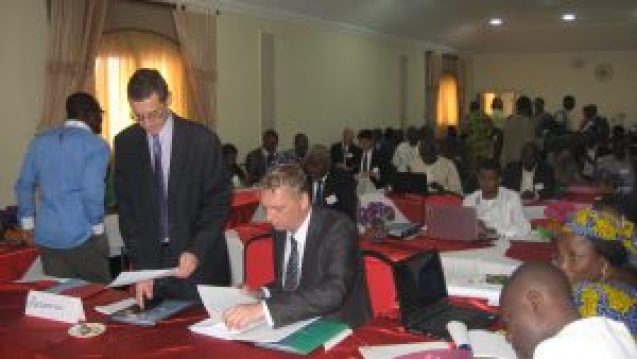
FG ANNOUNCES $85MILLION RECOVERY @ ANEEJ-SERAP PRE-GFAR MEETING – UPDATE
BACKGROUND
Anti-corruption stakeholders in Nigeria convened for a Preparatory Consultative Meeting ahead of the Global Forum on Asset Recovery (GFAR) scheduled to hold in Washington DC on December 4-6, 2017. The Pre-GFAR Consultative Meeting, held at Reiz Continental Hotel, Abuja on October 26, 2017, was organized by the Africa Network for Environment and Economic Justice (ANEEJ) in partnership with Socio-Economic Rights and Accountability Project (SERAP), the Office of the Attorney General and Ministry of Justice and the Open Government Partnership (OGP) Nigeria Secretariat. The event was supported by the Macarthur Foundation and UKAid.
The Forum attracted high level participation from government, the legislature, civil society, the private sector, international development partners and the diplomatic community. Goodwill messages were presented by the Honourable Attorney General and Minister of Justice, Mr. Abubakar Malami (SAN), the Coordinator of Nigeria’s OGP Secretariat, Mrs. Juliet Ibekaku-Nwagwu, the EFCC/NFIU, ICPC, the Swiss Ambassador to Nigeria, His Excellency Eric Mayooraz, the representative of the UK Embassy, and a strong civil society delegation from across Nigeria including the Centre LSD, the Centre for Social Justice, CSJ, the OGP Secretariat, Gender Awareness Trust, Policy Alert, HEDA Resource Centre, Youth Accountability Forum, SERDEC, CISLAC, Nigerian Institute of Estate Surveyors and Valuers, BudgIT/Open Alliance, the DFID.
- OBSERVATIONS
The panel discussants observed as follows:
- That corruption undermines economic development, political stability, rule of law and destroys public trust in democracy.
- That recovery of wealth stolen by politically exposed persons (PEPs) and stashed in developed countries, especially in secrecy havens, continues to be a tedious process in spite of international frameworks such as the UN Convention against Corruption (UNCAC) to which Nigeria is signatory.
- That the close collaboration between Nigerian government and civil society on the issue of asset recovery is highly commendable
- That the return of stolen assets is an important mechanism for financing the 2030 Agenda / Sustainable Development Goals (SDGs)
- KEY ACTIONS
Thus at the end of the Forum, the following actions were agreed upon along three levels:
Government of Nigeria
Government of Nigeria should act as follows:
- Divest the EFCC, ICPC and other law enforcement agencies of the responsibility of managing recovered assets and expedite action on the setting up of a special Agency under the proposed Proceeds of Crime (POC) Bill 2017 charged with applying, managing and coordinating the whole process of asset recovery, forfeiture and management of asset
- Strengthen the performance of existing institutions such as the EFCC, ICPC, Code of Conduct and, by providing clear mandates, sufficient resource allocation, data management and sharing, and effective coordination through an Inter-agency Task Team (IATT), to ensure that capacity, skills and resources are improved at all levels both as an interim measure ahead of the enactment of the POCA and within the framework of POCA
- Continue to provide revenue lines for recovered assets in the annual budgets to ensure that such resources can be expeditiously deployed as soon as they are received into projects that impact on the lives of Nigerian citizens
- Build capacity of the judiciary, media, lawyers, civil society, staff of anti-corruption agencies and legislators on asset recovery and management
- Strengthen existing laws on asset recovery in Nigeria particularly in the areas of non-conviction based confiscation powers and crimes of illicit enrichment, and provide accelerated hearing for the Proceeds of Crime (POC), Whistle Blower, Witness Protection and the Nigerian Financial Intelligence bills, among other anti-corruption legislation.
- Institutionalize a framework for working with Nigerian civil society post-GFAR to ensure effective implementation of the recently adopted National Anti-corruption Strategy, Memoranda of Understanding (MoU) and Mutual Legal Assistance (MLA) negotiations on stolen assets, and the management and utilization of such assets when recovered.
- Rethink the definition of national assets beyond financial assets and develop a national inventory and database of assets to ensure that illegal movement of public assets are easily tracked
Nigerian Civil Society
The Nigerian civil society should act as follows:
- Identify specific niche areas for advocacy within the asset recovery value chain and build capacity of non-state actors to engage in Asset Recovery efforts.
- Review the commitments of the London Anti-Corruption Summit and demand full implementation
- Conduct investigations and utilize the Freedom of Information (FOI) Act to demand for data on looted assets for use in advocacy
- Scale up campaigns for sanctions against safe havens and illicit financial flows, including highlighting the illicit roles of banks, investment agencies, real estate agents and other third parties
- Participate actively in the implementation and monitoring of Nigeria’s Open Government Partnership (OGP) commitments on anti-corruption at both national and sub-national levels
- Raise public awareness on asset recovery issues and build grassroots demand for the prevention, recovery and repatriation
- Develop, adopt and drive a shared domestic framework for monitoring the recovered loot
International Development Partners / Requested Countries
The International Development Partners / Requested Countries should act as follows:
- Fulfill their countries commitments under the 2016 London Anti-corruption Summit, and specific anti-corruption commitments made at the 2016 Nairobi 2nd High Level Meeting on Effective Development Cooperation, the Accra Agenda for Action and the Busan Partnership for Effective Development Cooperation
- Comply with the straightforward provisions of UNCAC rather than insist on less effective domestic laws and other complicated requirements in the matter of return of Nigeria’s assets
- Insist on participation of CSOs in the negotiations of bilateral agreements and Memoranda of Understanding (MoU) and in monitoring of returned assets to ensure
- Push for the use of existing laws in their home countries for the tracing, recovery and repatriation of stolen wealth from Nigeria and other developing countries
- Scale up support for Nigerian Civil Society groups working on anti-corruption and asset recovery.
Pre-GFAR Photo Gallery










http://punchng.com/321m-loot-fec-approves-mou-with-switzerland/
https://www.thisdaylive.com/index.php/2017/11/16/building-cooperation-partnerships-on-asset-recovery/